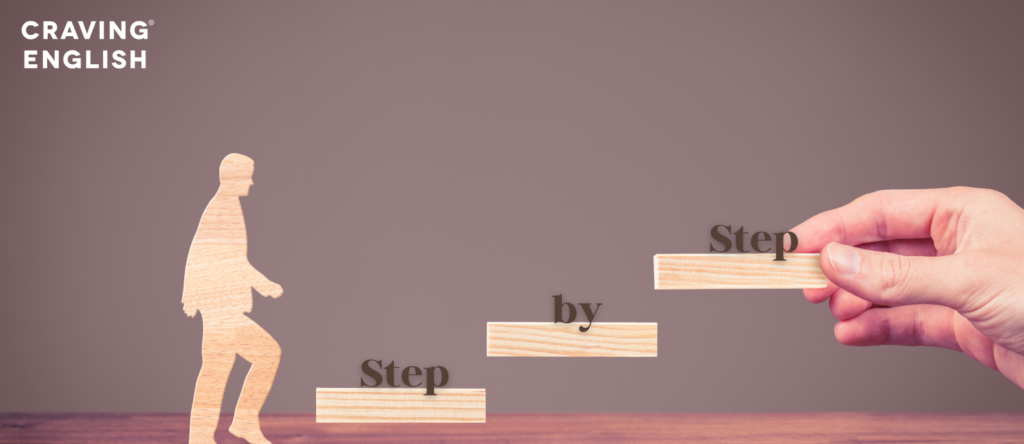Learning a language is a journey, and like any journey, it has its ups and downs which can make measuring your progress difficult. I know this from personal experience. At the beginning I struggled learning English and now, as we speak, I am attempting to learn other languages. With Italian, I went through a rollercoaster of ups and downs, some days I can hold full conversations and some days I still feel lost from the start, but I have come to realize that this is also part of the journey!
If you’ve ever felt stuck, you’re not alone. Progress in language learning isn’t always linear or easy to see, but that doesn’t mean it’s not happening. Sometimes, the changes are small, and it takes time to notice them. In this post, I want to share some tips to help you see your progress and understand what it means to move from one level to another.
____________________________________________________________________________________________________________________________________
Progress Isn’t Always Obvious

When you’re learning a new language, it’s natural to focus on what you can’t do yet. Maybe you’re still making mistakes with grammar, or you struggle to follow a conversation when someone speaks too fast. But it’s important to remember that every step you take brings you closer to your goals.
Think about it: when you were a baby learning your first language, you didn’t wake up one day speaking perfectly. You started with sounds, then words, then sentences. It’s the same with learning English (or any other language). Sometimes, you might feel like you’re stuck on a “plateau,” but even when progress feels slow, you’re building skills and improving in ways you might not notice right away.
Read a blog by one of our teachers talking about the intermediate plateau blues here!
Signs of Progress (Even If You Don’t Feel It)
Here are some signs that you’re improving, even if it doesn’t feel like it:
- You understand more than you used to.
Maybe you can follow the gist of a movie scene without subtitles, or you recognize words in a song you like. That’s progress! - You’re less afraid to speak.
Even if you still make mistakes, the fact that you’re willing to try shows growth in your confidence. - You catch your own mistakes.
This is a big one! If you notice when you say or write something wrong, it means you’re developing a deeper understanding of the language. - You can say the same thing in different ways.
Maybe instead of just saying “I like it,” now you can say, “I really enjoy it” or “It’s my favorite.” That’s progress in expanding your vocabulary.
What Does It Mean to Move from One Level to Another?

While it’s not necessary to know them, having a basic understanding of language learning levels, like A1, A2, B1, etc., helps us understand what we can do at each stage. But moving from one level to another isn’t about being perfect—it’s about feeling more comfortable and capable with the language.
Here’s what progress might look like as you go through the levels:
A1 to A2 (Beginner to Elementary):
- You can ask and answer simple questions.
- You understand basic phrases, like directions or time.
- You can introduce yourself and talk about everyday topics.
A2 to B1 (Elementary to Intermediate):
- You can talk about past experiences, like what you did last weekend.
- You understand simple stories or news articles.
- You feel more comfortable having short conversations.
B1 to B2 (Intermediate to Upper-Intermediate):
- You can express your opinions and explain your ideas.
- You can handle more complex conversations, like talking about your job or hobbies.
- You understand movies or TV shows better, even without subtitles.
B2 to C1 (Upper-Intermediate to Advanced):
- You can have detailed conversations about abstract or technical topics.
- You understand native speakers, even if they talk quickly or use slang.
You feel confident speaking in different settings, like at work or social events.
If you don’t know your level you can use the Craving Experience to get a free class and assessment!
How to Measure Your Progress

Here are some simple ways to track how far you’ve come:
1. Think About What You Can Do Now
Look back at where you started. Could you introduce yourself in English when you began? Could you write an email or hold a short conversation? Every new thing you can do is proof of your progress.
Tip: Write down your achievements, no matter how small. For example, “Today, I ordered coffee in English without hesitation.”
2. Set Small, Achievable Goals
Instead of focusing only on “becoming fluent,” break it into smaller steps. For example:
- Learn 10 new words this week.
- Watch a short video in English and summarize it.
- Hold a 5-minute conversation with someone.
When you reach these goals, you’ll see that you’re improving!
3. Use Real-Life Benchmarks
Your progress isn’t just about tests or quizzes—it’s about how you use the language in real life. Can you ask for directions, make small talk, or write a short note? These everyday tasks are signs of growth.
4. Take Regular Assessments
Online tests or feedback from your teacher can help you see where you stand. Remember, these are tools to guide you, not to judge you.
Progress Can Be Slow—And That’s Okay
One of the hardest parts of learning a language is that progress doesn’t always happen as quickly as we’d like. Sometimes, it feels like you’re not improving at all, but that’s not true.
Now as I am reaching two months in Switzerland I began to feel like I wasn’t getting anywhere.
Between strengthening my Italian and having difficulty finding a teacher that would teach Swiss-German (which is quite different from traditional German), I found myself feeling quite lost. I even thought about giving it up but every time I find little reminders that keep me going. It can be small things like understanding a joke or being able to order food and coffee at a restaurant. The other day I even understood a whole conversation at the dinner table and little by little I realized that I am making improvements.
Be kind to yourself during the slow moments. Progress is happening, even if it’s not visible yet.
Measure Progress and Celebrate Your Wins
Language learning isn’t just about reaching a final goal—it’s about enjoying the process. Celebrate every step forward, no matter how small.
- Did you understand a new word today? Celebrate!
- Did you have a conversation without translating in your head? That’s amazing!
Reward yourself for your hard work. Maybe watch your favorite show in English or treat yourself to something you love.
Final Thoughts
Measuring progress as a language learner is about more than levels or tests—it’s about recognizing how far you’ve come and staying motivated for the road ahead. Remember, learning a language is a journey, not a race.
Some days will feel harder than others, but every small step you take is bringing you closer to your goals. Trust the process, stay curious, and most importantly, enjoy it. You’re doing better than you think! 😊
If you want to listen to an incredible Craving Podcast that talks about this try the following episode:
You can do it!
______________________________________________________________________________________________________________________________________

